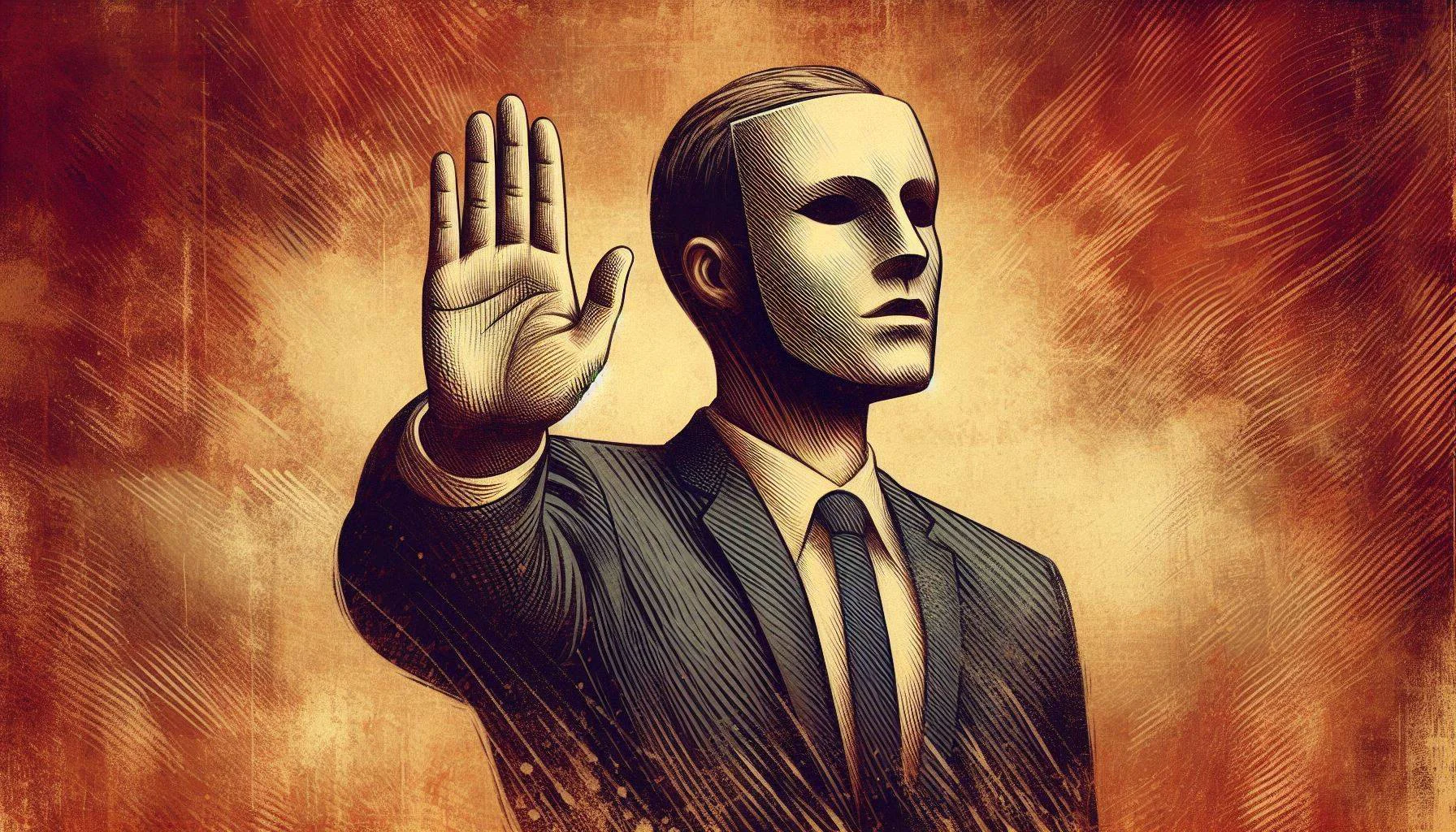
The ego is characterised by its fragility; it can be easily broken by insult or simple disagreement. Withdrawing from the status quo indirectly threatens the ego of the crowd. The crowd’s very existence, which perpetuates the status quo, strengthens the collective ego of its followers. People desire approval, and conforming to the crowd is indeed a reliable way to increase the likelihood of gaining it. However, this means relinquishing anything unique and authentic about one’s lifestyle, true passions, and potential self.
To accomplish this, one must suppress their ego, as choosing a path divergent from the norm will be inevitably met with opposition. In the modern day, these opponents manifest in various forms of social disapproval, such as cancellation, subtle expressions of disgust in groups, indirect ostracisation, baseless discrimination, censorship, bullying, and so forth. Historically, dissent and deviation from the collective ego could result in potential imprisonment, torture, or death, forcing the dissenter into exile if they were able. The bearded philosopher, Socrates, experienced such treatment when he was sentenced to death for educating the youth, accused of brainwashing their minds and defying the gods. Instead of fleeing, he accepted his absurd death sentence and faced the state’s charges against him with utmost courage.
This brings me to write about the concept of what I shall call Egocentric Insecurity. This term highlights the connection between insecurity and an underlying focus on oneself, suggesting that simply being insecure equates to being egocentric or self-important. Insecurity, regardless of its origin, always stems from self-absorption—an excessive preoccupation with how one is perceived, as if they are the centre of attention. This can manifest in various ways. Egocentric insecurity is a key factor in individuals who experience significant anxiety around others, making them timid and lacking assertiveness in social interactions. It also underlies a type of insecurity where individuals are highly self-comparative, leading them to become aggressive or snide with those they compare themselves to. They begin to concoct reasons in their minds to justify their hatred towards you, based on their erroneous perception that you are the source of their insecurity. Additionally, it is evident in bullies and mean individuals who undermine others, such as typical high school or workplace bullies, masking their deep insecurities with malevolent behaviour.
From the book, Denial.

[{"id":1772,"link":"https:\/\/danielbrynmor.com\/innate-deviation-and-the-collective-lack-of-self\/","name":"innate-deviation-and-the-collective-lack-of-self","thumbnail":{"url":"https:\/\/danielbrynmor.com\/wp-content\/uploads\/2025\/12\/fasfaasfa.jpg","alt":""},"title":"Innate Deviation and the Collective Lack of Self","postMeta":[],"author":{"name":"Daniel Brynmor","link":"https:\/\/danielbrynmor.com\/author\/braiddunig\/"},"date":"Feb 11, 2026","dateGMT":"2026-02-11 20:09:42","modifiedDate":"2026-02-11 20:09:43","modifiedDateGMT":"2026-02-11 20:09:43","commentCount":"0","commentStatus":"open","categories":{"coma":"<a href=\"https:\/\/danielbrynmor.com\/category\/essays\/culture\/\" rel=\"category tag\">Culture<\/a>, <a href=\"https:\/\/danielbrynmor.com\/category\/essays\/\" rel=\"category tag\">Essays<\/a>, <a href=\"https:\/\/danielbrynmor.com\/category\/essays\/philosophy\/\" rel=\"category tag\">Philosophy<\/a>, <a href=\"https:\/\/danielbrynmor.com\/category\/essays\/psychology\/\" rel=\"category tag\">Psychology<\/a>","space":"<a href=\"https:\/\/danielbrynmor.com\/category\/essays\/culture\/\" rel=\"category tag\">Culture<\/a> <a href=\"https:\/\/danielbrynmor.com\/category\/essays\/\" rel=\"category tag\">Essays<\/a> <a href=\"https:\/\/danielbrynmor.com\/category\/essays\/philosophy\/\" rel=\"category tag\">Philosophy<\/a> <a href=\"https:\/\/danielbrynmor.com\/category\/essays\/psychology\/\" rel=\"category tag\">Psychology<\/a>"},"taxonomies":{"post_tag":""},"readTime":{"min":2,"sec":55},"status":"publish","excerpt":""},{"id":1775,"link":"https:\/\/danielbrynmor.com\/the-inauthenticity-of-fads\/","name":"the-inauthenticity-of-fads","thumbnail":{"url":"https:\/\/danielbrynmor.com\/wp-content\/uploads\/2025\/12\/Image_fx-3njkhbjk.jpg","alt":""},"title":"The Inauthenticity of Fads","postMeta":[],"author":{"name":"Daniel Brynmor","link":"https:\/\/danielbrynmor.com\/author\/braiddunig\/"},"date":"Feb 11, 2026","dateGMT":"2026-02-11 20:09:14","modifiedDate":"2026-02-11 20:09:17","modifiedDateGMT":"2026-02-11 20:09:17","commentCount":"0","commentStatus":"open","categories":{"coma":"<a href=\"https:\/\/danielbrynmor.com\/category\/essays\/culture\/\" rel=\"category tag\">Culture<\/a>, <a href=\"https:\/\/danielbrynmor.com\/category\/essays\/\" rel=\"category tag\">Essays<\/a>","space":"<a href=\"https:\/\/danielbrynmor.com\/category\/essays\/culture\/\" rel=\"category tag\">Culture<\/a> <a href=\"https:\/\/danielbrynmor.com\/category\/essays\/\" rel=\"category tag\">Essays<\/a>"},"taxonomies":{"post_tag":""},"readTime":{"min":3,"sec":4},"status":"publish","excerpt":""},{"id":1776,"link":"https:\/\/danielbrynmor.com\/auto-conformity-in-solitude\/","name":"auto-conformity-in-solitude","thumbnail":{"url":"https:\/\/danielbrynmor.com\/wp-content\/uploads\/2025\/12\/Image_fx-3nbjmnb.jpg","alt":""},"title":"Auto-Conformity in Solitude","postMeta":[],"author":{"name":"Daniel Brynmor","link":"https:\/\/danielbrynmor.com\/author\/braiddunig\/"},"date":"Feb 11, 2026","dateGMT":"2026-02-11 20:09:01","modifiedDate":"2026-02-11 20:09:02","modifiedDateGMT":"2026-02-11 20:09:02","commentCount":"0","commentStatus":"open","categories":{"coma":"<a href=\"https:\/\/danielbrynmor.com\/category\/essays\/culture\/\" rel=\"category tag\">Culture<\/a>, <a href=\"https:\/\/danielbrynmor.com\/category\/essays\/\" rel=\"category tag\">Essays<\/a>, <a href=\"https:\/\/danielbrynmor.com\/category\/essays\/psychology\/\" rel=\"category tag\">Psychology<\/a>","space":"<a href=\"https:\/\/danielbrynmor.com\/category\/essays\/culture\/\" rel=\"category tag\">Culture<\/a> <a href=\"https:\/\/danielbrynmor.com\/category\/essays\/\" rel=\"category tag\">Essays<\/a> <a href=\"https:\/\/danielbrynmor.com\/category\/essays\/psychology\/\" rel=\"category tag\">Psychology<\/a>"},"taxonomies":{"post_tag":""},"readTime":{"min":2,"sec":32},"status":"publish","excerpt":""},{"id":1777,"link":"https:\/\/danielbrynmor.com\/unfit-for-an-unopen-society\/","name":"unfit-for-an-unopen-society","thumbnail":{"url":"https:\/\/danielbrynmor.com\/wp-content\/uploads\/2025\/12\/sdasfcas.jpg","alt":""},"title":"Unfit for An Unopen Society","postMeta":[],"author":{"name":"Daniel Brynmor","link":"https:\/\/danielbrynmor.com\/author\/braiddunig\/"},"date":"Feb 11, 2026","dateGMT":"2026-02-11 20:08:39","modifiedDate":"2026-02-11 20:08:40","modifiedDateGMT":"2026-02-11 20:08:40","commentCount":"0","commentStatus":"open","categories":{"coma":"<a href=\"https:\/\/danielbrynmor.com\/category\/essays\/culture\/\" rel=\"category tag\">Culture<\/a>, <a href=\"https:\/\/danielbrynmor.com\/category\/essays\/\" rel=\"category tag\">Essays<\/a>","space":"<a href=\"https:\/\/danielbrynmor.com\/category\/essays\/culture\/\" rel=\"category tag\">Culture<\/a> <a href=\"https:\/\/danielbrynmor.com\/category\/essays\/\" rel=\"category tag\">Essays<\/a>"},"taxonomies":{"post_tag":""},"readTime":{"min":1,"sec":59},"status":"publish","excerpt":""},{"id":1778,"link":"https:\/\/danielbrynmor.com\/micro-and-macro-deviance\/","name":"micro-and-macro-deviance","thumbnail":{"url":"https:\/\/danielbrynmor.com\/wp-content\/uploads\/2025\/12\/fsafasfffff.jpg","alt":""},"title":"Micro and Macro Deviance","postMeta":[],"author":{"name":"Daniel Brynmor","link":"https:\/\/danielbrynmor.com\/author\/braiddunig\/"},"date":"Feb 11, 2026","dateGMT":"2026-02-11 20:08:21","modifiedDate":"2026-02-11 20:08:28","modifiedDateGMT":"2026-02-11 20:08:28","commentCount":"0","commentStatus":"open","categories":{"coma":"<a href=\"https:\/\/danielbrynmor.com\/category\/essays\/culture\/\" rel=\"category tag\">Culture<\/a>, <a href=\"https:\/\/danielbrynmor.com\/category\/essays\/\" rel=\"category tag\">Essays<\/a>, <a href=\"https:\/\/danielbrynmor.com\/category\/essays\/philosophy\/\" rel=\"category tag\">Philosophy<\/a>, <a href=\"https:\/\/danielbrynmor.com\/category\/essays\/psychology\/\" rel=\"category tag\">Psychology<\/a>","space":"<a href=\"https:\/\/danielbrynmor.com\/category\/essays\/culture\/\" rel=\"category tag\">Culture<\/a> <a href=\"https:\/\/danielbrynmor.com\/category\/essays\/\" rel=\"category tag\">Essays<\/a> <a href=\"https:\/\/danielbrynmor.com\/category\/essays\/philosophy\/\" rel=\"category tag\">Philosophy<\/a> <a href=\"https:\/\/danielbrynmor.com\/category\/essays\/psychology\/\" rel=\"category tag\">Psychology<\/a>"},"taxonomies":{"post_tag":""},"readTime":{"min":1,"sec":6},"status":"publish","excerpt":""},{"id":1753,"link":"https:\/\/danielbrynmor.com\/alcohol-is-a-legal-poison\/","name":"alcohol-is-a-legal-poison","thumbnail":{"url":"https:\/\/danielbrynmor.com\/wp-content\/uploads\/2025\/12\/fasfsafasfasf.jpg","alt":""},"title":"Alcohol is a Legal Poison","postMeta":[],"author":{"name":"Daniel Brynmor","link":"https:\/\/danielbrynmor.com\/author\/braiddunig\/"},"date":"Feb 11, 2026","dateGMT":"2026-02-11 20:04:11","modifiedDate":"2026-02-11 20:04:12","modifiedDateGMT":"2026-02-11 20:04:12","commentCount":"0","commentStatus":"open","categories":{"coma":"<a href=\"https:\/\/danielbrynmor.com\/category\/essays\/culture\/\" rel=\"category tag\">Culture<\/a>, <a href=\"https:\/\/danielbrynmor.com\/category\/essays\/\" rel=\"category tag\">Essays<\/a>","space":"<a href=\"https:\/\/danielbrynmor.com\/category\/essays\/culture\/\" rel=\"category tag\">Culture<\/a> <a href=\"https:\/\/danielbrynmor.com\/category\/essays\/\" rel=\"category tag\">Essays<\/a>"},"taxonomies":{"post_tag":""},"readTime":{"min":2,"sec":32},"status":"publish","excerpt":""}]
